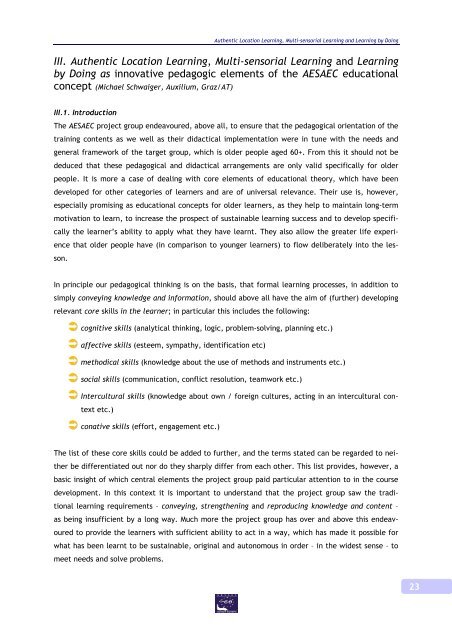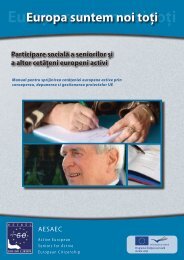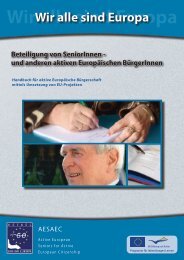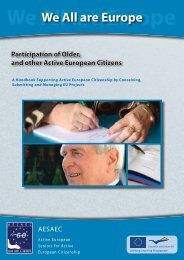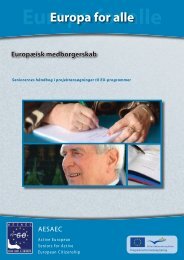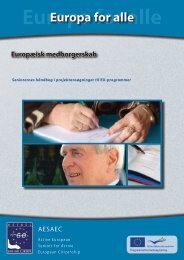We All are Europe - AESAEC
We All are Europe - AESAEC
We All are Europe - AESAEC
Create successful ePaper yourself
Turn your PDF publications into a flip-book with our unique Google optimized e-Paper software.
Authentic Location Learning, Multi-sensorial Learning and Learning by Doing<br />
III. Authentic Location Learning, Multi-sensorial Learning and Learning<br />
by Doing as innovative pedagogic elements of the <strong>AESAEC</strong> educational<br />
concept (Michael Schwaiger, Auxilium, Graz/AT)<br />
III.1. Introduction<br />
The <strong>AESAEC</strong> project group endeavoured, above all, to ensure that the pedagogical orientation of the<br />
training contents as we well as their didactical implementation were in tune with the needs and<br />
general framework of the target group, which is older people aged 60+. From this it should not be<br />
deduced that these pedagogical and didactical arrangements <strong>are</strong> only valid specifically for older<br />
people. It is more a case of dealing with core elements of educational theory, which have been<br />
developed for other categories of learners and <strong>are</strong> of universal relevance. Their use is, however,<br />
especially promising as educational concepts for older learners, as they help to maintain long-term<br />
motivation to learn, to increase the prospect of sustainable learning success and to develop specifically<br />
the learner’s ability to apply what they have learnt. They also allow the greater life experience<br />
that older people have (in comparison to younger learners) to flow deliberately into the lesson.<br />
In principle our pedagogical thinking is on the basis, that formal learning processes, in addition to<br />
simply conveying knowledge and information, should above all have the aim of (further) developing<br />
relevant core skills in the learner; in particular this includes the following:<br />
cognitive skills (analytical thinking, logic, problem-solving, planning etc.)<br />
affective skills (esteem, sympathy, identification etc)<br />
methodical skills (knowledge about the use of methods and instruments etc.)<br />
social skills (communication, conflict resolution, teamwork etc.)<br />
Intercultural skills (knowledge about own / foreign cultures, acting in an intercultural context<br />
etc.)<br />
conative skills (effort, engagement etc.)<br />
The list of these core skills could be added to further, and the terms stated can be regarded to neither<br />
be differentiated out nor do they sharply differ from each other. This list provides, however, a<br />
basic insight of which central elements the project group paid particular attention to in the course<br />
development. In this context it is important to understand that the project group saw the traditional<br />
learning requirements – conveying, strengthening and reproducing knowledge and content –<br />
as being insufficient by a long way. Much more the project group has over and above this endeavoured<br />
to provide the learners with sufficient ability to act in a way, which has made it possible for<br />
what has been learnt to be sustainable, original and autonomous in order – in the widest sense – to<br />
meet needs and solve problems.<br />
23


